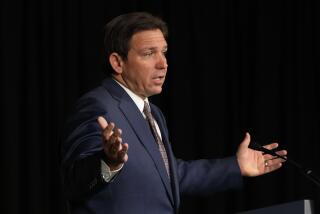Judge Irving May Play Role in Suits Facing Lincoln S
- Share via
SAN DIEGO — U.S. District Judge J. Lawrence Irving, who is quitting the San Diego federal bench because of frustration over rigid sentencing guidelines, said Thursday that he may be appointed to try to settle a huge jam of civil suits linked to the failure of Irvine-based Lincoln Savings & Loan.
Irving, 55, considered one of the keenest federal judges in California, said Judge Richard M. Bilby, an Arizona federal judge presiding over the complex and unwieldy collection of Lincoln Savings suits, asked him recently whether he would be interested in conducting settlement talks.
Irving, who announced last week that his plans upon leaving the bench include the arbitration of complex civil lawsuits, stressed Thursday that he has not yet been formally offered any post. But, if offered, he said he would seriously consider accepting because it would be “right down my alley” and “one heck of a challenging assignment.”
The cases involve billions of dollars in securities fraud and racketeering claims filed by the federal government and by 23,000 small investors, many elderly, who bought debt securities sold by Lincoln.
The cases name Phoenix businessman Charles H. Keating Jr., chairman of Lincoln’s former parent company, American Continental Corp. of Phoenix, and other American Continental executives. The cases also name other Lincoln officers and directors, the thrift’s lawyers, its accountants and business contacts.
Originally filed in courts across the nation, the suits have been consolidated before Bilby and are scheduled to go to trial in September, 1991.
Among the cases is a racketeering claim filed by the Resolution Trust Corp., the federal agency that manages failed thrifts, seeking $1.1 billion in damages. Another bunch of suits seeks the recovery of $250 million lost by bondholders.
A 46-count securities fraud criminal case against Keating and three associates, in state court in Los Angeles, is not directly related to the civil suits in Arizona.
Bilby could not be reached Thursday for comment.
Irving said he did not know Thursday what an attempt to settle the cases would involve.
“Until I know more about it, I don’t intend to make a decision,” he said. “Until I know more about the time involved and more of the details, I can’t make a decision.”
Since announcing Sept. 26 that he will be the first judge in the nation to leave the bench because of the sentencing guidelines, Irving has been deluged with job offers from law firms around California. He intends to step down Jan. 1.
Irving announced last week that he intends to become affiliated with his former partner, Douglas M. Butz, whose San Diego firm--Butz, Lucas, Dunn & Enright--specializes in the defense of civil lawsuits. He will not be a partner but will be affiliated with the firm, with the title of counsel.
In making last week’s announcement, Irving, who was considered one of San Diego’s most able trial lawyers before his appointment eight years ago to the federal bench, said he does not plan a return to the practice of law. From 1963 to 1982, Irving ran a private practice in San Diego, specializing in legal and medical malpractice defense.
He said he wants to help lawyers settle complex civil lawsuits already in the court system and to mediate disputes before they become suits.
President Reagan appointed Irving to the federal bench--and the promise of lifetime tenure--in 1982. But Irving said in September that he is stepping down because he considers the sentencing guidelines unfair, especially the mandatory sentences imposed on first-time drug offenders.
Based upon the idea that prison is designed to punish, not rehabilitate, the guidelines sharply reduce a judge’s discretion in sentencing convicted criminals.
During his eight years on the bench, Irving has drawn a significant number of high-profile cases.
Most recently, he presided over the trial last summer of Richard T. Silberman, a one-time governor’s aide and wealthy San Diego financier, who was convicted of one felony count and later pleaded guilty to another in connection with a money-laundering scheme.
A San Diego native, Irving went to college and law school at the University of Southern California. He is a graduate of Point Loma High School.
More to Read
Inside the business of entertainment
The Wide Shot brings you news, analysis and insights on everything from streaming wars to production — and what it all means for the future.
You may occasionally receive promotional content from the Los Angeles Times.










